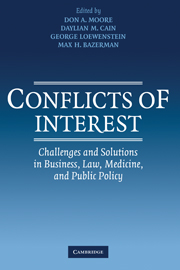Book contents
- Frontmatter
- Contents
- List of Contributors
- Acknowledgments
- Introduction
- PART ONE BUSINESS
- PART TWO MEDICINE
- PART THREE LAW
- 13 Legal Responses to Conflicts of Interest
- 14 Commentary: Conflicts of Interest Begin Where Principal–Agent Problems End
- 15 Conflicts of Interest and Strategic Ignorance of Harm
- 16 Commentary: Strategic Ignorance of Harm
- PART FOUR PUBLIC POLICY
- Index
- References
15 - Conflicts of Interest and Strategic Ignorance of Harm
Published online by Cambridge University Press: 04 August 2010
- Frontmatter
- Contents
- List of Contributors
- Acknowledgments
- Introduction
- PART ONE BUSINESS
- PART TWO MEDICINE
- PART THREE LAW
- 13 Legal Responses to Conflicts of Interest
- 14 Commentary: Conflicts of Interest Begin Where Principal–Agent Problems End
- 15 Conflicts of Interest and Strategic Ignorance of Harm
- 16 Commentary: Strategic Ignorance of Harm
- PART FOUR PUBLIC POLICY
- Index
- References
Summary
Professionals with conflicts of interest face a choice between acting in accord with their self-interest or their professional responsibility. As this choice nearly always has consequences for others, an understanding of these conflicts necessarily entails a discussion of social preferences. In this discussion, I defend the notion that altruistic behavior often results from a desire not to violate rules of ethical conduct, rather than, as current economic theories suggest, a taste for altruistic outcomes per se. Whereas some situations compel people to sacrifice personal gains in favor of social concerns, these same individuals may prefer to avoid such situations in order to be selfish. For example, one may forgo even costless information about the consequences for others of a desired action, as discovering that the action is harmful could compel one not to take it. As described later, such an agent would be engaging in “strategic ignorance of harm.”
Rather than an intentional violation of ethical or moral rules, professional misconduct is often best described as a circumvention of them. Although this distinction might appear pedantic, it suggests challenges and opportunities for how we deal with the problem. In particular, our tendency to give the benefit of doubt in determining whether one has violated a moral rule provides incentives for strategic ignorance of harm, as ignorance raises a question of intent. I will discuss how conflicts can thus remain problematic even where extensive oversight and punishment are possible.
- Type
- Chapter
- Information
- Conflicts of InterestChallenges and Solutions in Business, Law, Medicine, and Public Policy, pp. 206 - 223Publisher: Cambridge University PressPrint publication year: 2005
References
- 4
- Cited by



